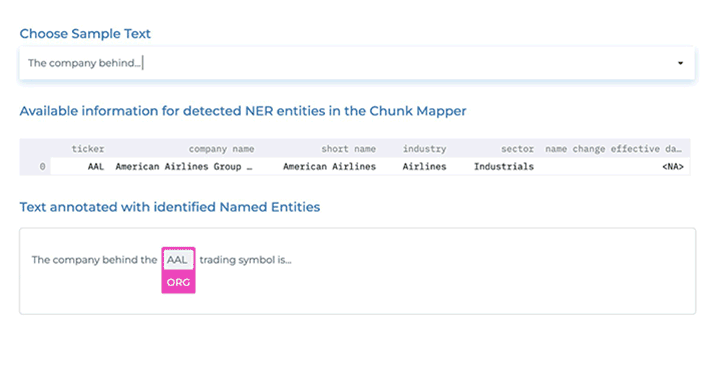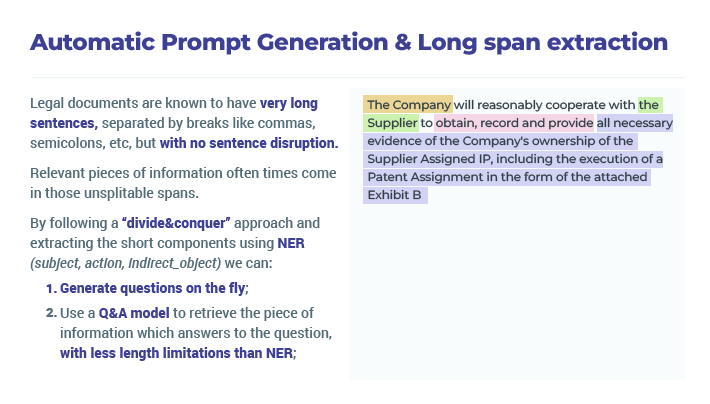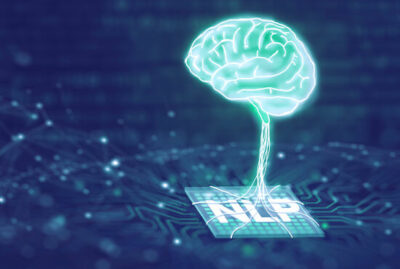
The most widely used NLP library in Legal
As with last year’s survey, Spark NLP is the most popular library for production use
How Vakilsearch Understands Scanned Legal & Tax Forms with Legal NLP

- The document classification pipeline outperformed the comparable pipelines by 9% and attained 96% accuracy.
- The identity card information extraction pipeline achieved 87% accuracy
- The mailing address resolution pipeline achieved 89% accuracy
What’s in the Box

Legal NLP in Action

Automatically identify relationships even when they are mentioned using aliases.


Enrich extracted company names with additional EDGAR information.


Use a Q&A model to retrieve the piece of valuable information with less length limitations than NER.
De-identify and mask sensitive personal information in documents and images.

Frequently Asked Questions
1. Legal Document Data Extraction: NLP techniques extract key information from documents, such as contracts, agreements, and court filings. This involves identifying relevant entities (such as names, dates, and addresses) and extracting structured data for further analysis.
2. Summarization and Abstraction: NLP can automatically summarize lengthy legal documents, condensing complex text into concise and easily understandable summaries. This aids lawyers, researchers, and professionals in quickly grasping the main points of a document.
3. Entity Recognition: By employing advanced NLP models and techniques like Named Entity Recognition (NER) and dependency parsing, legal professionals can efficiently locate and classify key entities such as individuals, organizations, dates, and legal terms. This technology not only expedites the extraction of vital information from contracts, agreements, and court filings but also aids in the organization, analysis, and retrieval of relevant data.
4. Legal Research: NLP-powered tools can assist legal professionals in conducting comprehensive research by analyzing vast amounts of legal text to identify relevant cases, statutes, regulations, and precedents.
5. Document Classification: NLP techniques can automatically categorize legal documents based on their content, helping law firms and organizations efficiently manage their document repositories.
6. Sentiment Analysis: Natural Language Processing can determine the sentiment expressed in legal texts, helping lawyers and legal analysts gauge the emotional tone of documents, which can be crucial in assessing potential risks and implications.
7. Topic Modeling: NLP can uncover underlying topics and themes within large sets of legal documents, aiding in identifying trends, patterns, and areas of focus within the legal field.
8. Contract Analysis: Machine learning tools can assist in the analysis of contracts by identifying clauses, conditions, and obligations, thus enabling quicker contract review and due diligence processes.
9. Named Entity Linking: NLP techniques can link named entities in legal documents to external databases, providing additional context and information about individuals, organizations, or legal concepts.
10. Language Translation: NLP can facilitate cross-border legal operations by offering automated translation services for documents written in different languages.
Leveraging NLP for legal documents introduces an array of transformative capabilities to the legal domain. Through the application of natural language processing, legal professionals can revolutionize their approach to handling complex texts.
NLP for legal documents facilitates data extraction, enabling efficient identification and extraction of essential entities, clauses, and information from contracts and agreements. This technology empowers practitioners to read documents comprehensively, as NLP algorithms decipher intricate legal jargon and document structures.
With the aid of NLP Python libraries, data scientists can develop tailored solutions for diverse NLP applications in legal, automating tasks like summarization, sentiment analysis, and entity recognition. This fusion of NLP and legal documents streamlines legal research, enhances due diligence processes, and introduces a new dimension of accuracy and efficiency to the industry.
Harnessing the power of NLP for legal document data extraction introduces a revolutionary approach to processing intricate legal texts. With natural language processing techniques tailored for the legal domain, professionals can significantly streamline the extraction of valuable insights from contracts, agreements, and other legal documents.
Legal NLP employs advanced algorithms such as named entity recognition and pattern matching to pinpoint essential information, including dates, entities, clauses, and legal terminology. This technology enables rapid and accurate legal document data extraction, reducing manual effort and enhancing the precision of information retrieval.
Utilizing NLP Python tools, data scientists can craft customized solutions, automating the extraction process and facilitating seamless integration into existing workflows. Embracing NLP applications in legal, especially for data extraction, empowers legal experts to perform due diligence, compliance checks, and contract analysis with unparalleled efficiency and accuracy.
Efficient Document Handling: Legal NLP solutions streamline management by categorizing, organizing, and archiving documents, simplifying retrieval and minimizing manual sorting efforts.
Automated Data Extraction: Leveraging NLP for legal document data extraction, vital information within contracts and agreements is extracted accurately and swiftly, reducing time spent on manual data extraction tasks.
Enhanced Document Understanding: Legal NLP empowers management by allowing quick comprehension of complex legal documents, enabling efficient review cycles and precise identification of clauses, obligations, and terms.
Informed Decision-Making: Legal professionals benefit from NLP's capability to analyze vast volumes of legal text, providing data-driven insights for strategic decision-making, risk assessment, and compliance checks.
Accelerated Due Diligence: Legal NLP expedites due diligence processes through efficient information extraction and automated analysis, facilitating faster assessments for legal audits and business transactions.
Time-Saving Automation: With NLP Python legal document tools, routine tasks such as summarization, sentiment analysis, and entity recognition are automated, allowing legal teams to concentrate on higher-level strategic activities.
Cross-Document Insights: Legal NLP unveils hidden trends, patterns, and correlations within extensive legal databases, providing comprehensive insights for informed management decisions.
























